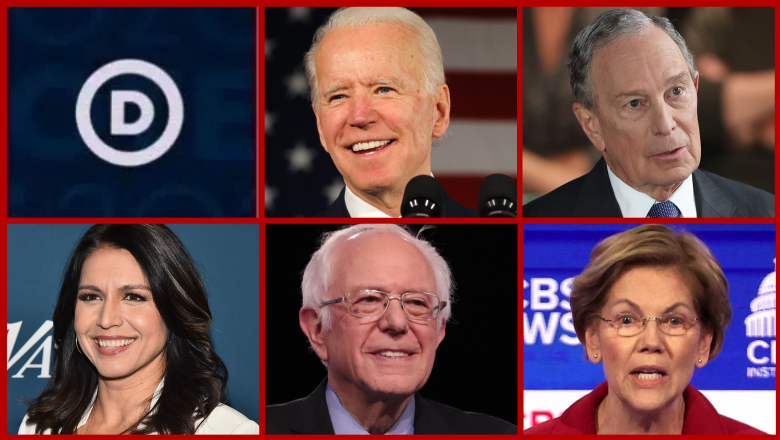
Getty Super Tuesday
Today is Super Tuesday, where 1,344 pledged delegates are up for grabs. This is a big day for the Democratic nomination. But when will we know the results? When do polls close? Here are the times that polls will close in all 14 states today, including time zones.
In some states, we’ll know a projected winner possibly within minutes of the polls closing, depending on how the exit polls appear, as just happened in South Carolina. In other states, it could take hours or even longer to have an idea of who is winning.
The Earliest Polls Close at 7 PM Eastern & the Last Polls Close at 11 PM Eastern
The first results could start coming in as early as 7 p.m. Eastern (6 p.m. Central/4 p.m. Pacific/5 p.m. Mountain.) These are when Virginia and Vermont’s polls close. The latest results will come in after 8 p.m. Pacific/10 p.m. Central/11 p.m. Eastern/9 p.m. Mountain (this would be for California’s results.)
Here are the times the polls close in each state. The local time is listed first.
Alabama: 7 p.m. Central / 8 p.m. Eastern
Arkansas: 7:30 p.m. Central / 8:30 p.m. Eastern
California: 8 p.m. Pacific (10 p.m. Central/11 p.m. Eastern)
Colorado: 7 p.m. Mountain (8 p.m. Central / 9 p.m. Eastern)
Maine: 8 p.m. Eastern / 7 p.m. Central
Massachusetts: 8 p.m. Eastern / 7 p.m. Central
Minnesota: 8 p.m. Central / 9 p.m. Eastern
North Carolina: 7:30 p.m. Eastern / 6:30 p.m. Central
Oklahoma: 7 p.m. Central / 8 p.m. Eastern
Tennessee: 8 p.m. Eastern/ 7 p.m. Central
Texas: 7 p.m. Central / 8 p.m. Eastern
Utah: 8 p.m. Mountain (9 p.m. Central / 10 p.m. Eastern)
Vermont: 7 p.m. Eastern / 6 p.m. Central
Virginia: 7 p.m. Eastern / 6 p .m. Central
Note that for California, we might actually not get the final results for several days. This is because California accepts mail-in ballots that are postmarked for today, and those could take several days to arrive. So California’s wealth of delegates might take awhile to determine.
Here are the Delegates Leading Up to Super Tuesday & Where Buttiegieg’s & Klobuchar’s Will Go
Leading up to Super Tuesday, things have been a little confusing. Sanders has secured 60 delegates, Biden has secured 53, Pete Buttigieg 26, Warren 8, and Klobuchar 7.
But Buttigieg and Klobuchar just dropped out and they both endorsed Biden. You might think this would mean that Biden would automatically secure 33 additional delegates, giving him a total of 86, which would put him ahead of Sanders. However, this isn’t technically how things work in the DNC. Sources told Heavy that even when a candidate endorses someone else, their delegates are still technically able to vote for whoever they want according to the DNC’s rules. Although it’s likely they would follow their candidates’ suggestions, they aren’t bound to that.
The DNC also released a memo the night before Super Tuesday explaining this. The DNC noted: “it should be noted that pledged delegates to the Democratic Convention are not legally ‘bound’ to vote for the candidate for whom they were elected. Rather, they are ‘pledged in all good conscience [to] reflect the sentiments of those who elected them.’ [Rule 12.J] Under Democratic rules, delegates are always able to vote for their candidate of choice. Because presidential campaigns have the right to review and approve delegate candidates prior to their selection, delegates generally do remain committed to vote for their preferred candidate as long as their candidate is still viable. In cases where a candidate asks his/her delegates to support another candidate, or where a candidate who has accrued delegates drops out — it is the delegate’s prerogative to either follow the candidate’s request or to vote for the candidate of their choice.”
This means that Buttigieg’s and Klobuchar’s delegates are technically still up for grabs.
The Democratic National Convention will take place July 13-16. According to Ballotpedia, there will be 4,750 delegates total, including 3,979 pledged and 771 automatic (more commonly known as superdelegates.) In order to not have a contested convention, a candidate needs 1,991 pledged delegates on the first ballot. (Superdelegates aren’t allowed to vote on the first ballot.) If no candidate gets this majority of pledged delegates, then a second ballot (or more) will take place and both pledged and automatic delegates can vote this time. From then on, a candidate needs the majority of all delegates to win, which is more than 2,375 votes.
READ NEXT: What Time Do Super Tuesday Polls Close? When Do We Know Who Won?